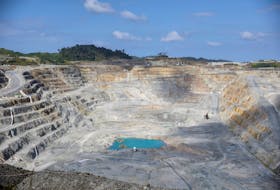Climate change is important to the Canada Pension Plan Investment Board, but it’s not ready to divest of its holdings in conventional oil and gas.
Although a segment of the Canadian population may want the CPPIB to drop conventional energy, the board’s top spokesman says its investment decisions are not necessarily motivated by politics or a change in public policy.
Michel Leduc, CPPIB senior managing director and global head of public affairs and communications, said in a phone interview on Monday that conventional energy sources are not going away as quickly as some people may believe, and oil and gas will have a role in the global economy for some time to come.

It is the investment board’s view that conventional oil and gas is still a good investment, providing a good return for years to come, said Leduc, and the board will maintain such investments.
The conventional oil and gas companies are making the switch to unconventional wind and solar energy themselves, Leduc argued, so if the CPPIB was to cut its investment in such companies it would actually help slow the transition from conventional to renewable energy.
The subject of energy may come up again Tuesday when Leduc hosts a CPPIB virtual town hall for Nova Scotians, during which he will explain what the investment board is doing with its $430-billion fund.
Every second year, the CPPIB holds public meetings individually for each province and the northern territories throughout October. Nova Scotia is the second last of year’s presentations.
There are a total of 20 million CPP contributors and beneficiaries in Canada and, of that, there are 461,799 contributors and 220,693 retirement beneficiaries in Nova Scotia.
Leduc said that despite the economic concern brought about by the COVID-19 pandemic, the solvency and sustainability of the Canada Pension Plan is on solid footing for at least the next 75 years.
Before the creation of the CPPIB in 1997, the Canada Pension Plan was 100 per cent invested in government debt, Leduc said. To better prepare for so-called black swan events, such as a pandemic, the investment board has diversified the fund.
The fund is invested in three broad categories: 20 per cent in fixed income, which is mainly sovereign bonds and provincial bonds; 53 per cent in equities, both publicly traded stocks and private companies wholly controlled by the CPPIB; and the remainder would be in real assets, which includes toll roads, commercial real estate and ports, which provide steady income for a long period.
Geographically, only about 15 per cent of the CPPIB’s investments are in Canada, Leduc said, and about 85 per cent is invested across the developed economies of the world.
Considering that Canada represents only about three per cent of global markets, most of the CPPIB investments are outside of the country to be fully diversified and protect the fund from downturns in the Canadian economy.
The largest portion of the outside investments are in the United States, followed by Europe, Japan, South Korea and then developing countries, which includes China, India, Brazil, Mexico, Chile and Colombia.
In Canada, the fund is invested in both conventional and renewable energy, the financial sector and technology, including Ottawa-based tech darling Shopify, Leduc said.
The CPPIB has a 50 per cent holding in the 407 toll highway in Ontario, which has proven to be the investment board’s largest investment so far.
In Nova Scotia, the fund has investments in Empire Co. Ltd., parent of the Sobeys grocery chain, and Crombie REIT, both of which are controlled by the founding Sobey family of Pictou County.
Internationally, the CPPIB owns 23 ports in the United Kingdom, which also provide steady income over a long period.
CPPIB VIRTUAL TOWN HALL
The virtual Canada Pension Plan Investment Board town halls are accessed at cppinvestments.com/publicmeetings. The Nova Scotia session is scheduled for today from noon to 1 p.m.
To join, click the link for the meeting and register with an email address. Registrants will get a response and can submit a question in advance.
In Nova Scotia, 461,799 residents are CPP contributors (47.9 per cent of the provincial population) and 220,693 are CPP retirement beneficiaries (22.9 per cent of the population).









